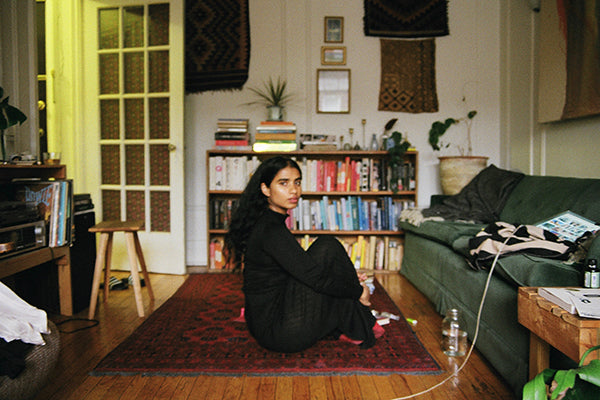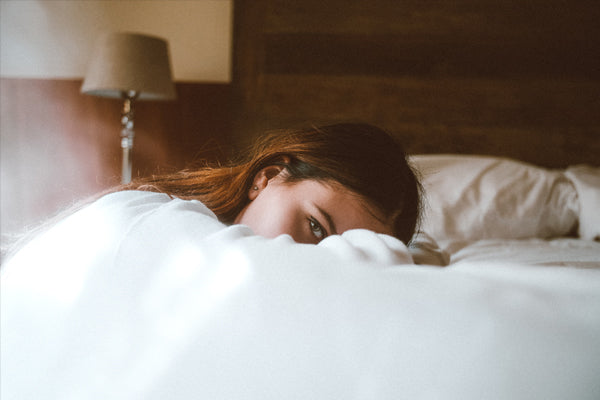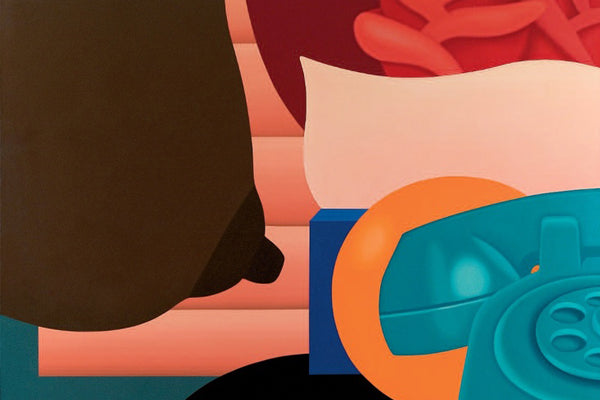
Between the Sheets | Fariha Roísín
This time on Between the Sheets we're talking to Fariha Roísín, a writer based in New York City. If you're familiar with her work, you know that she can freestyle on art, feminism, race, culture, self-care, and pretty much anything else you throw at her with grace. And if you're not, you have some very good reading to catch up on this weekend!
Read on for a discussion on the importance of rituals, issues with access to self-care, and practicing abundance with yourself and others...
Hi Fariha! Tell us a bit about yourself.
I'm a writer, living in New York.
As a writer and freelancer, how important is self-care in your life?
Self care is deeply important to me, as a survival mechanism. Without it, I’d fall apart, and I think I began to understand that in my early 20s, after being messy for a few years. I constantly found myself in the same place, again and again, and I was also always so surprised that people wouldn’t take care of me, that people could hurt me, and that I was allowing them to do that because I felt so shitty about myself. It took a while to understand that humans don’t always reciprocate care. And so that was the birth of my self care practice. It was an awareness that I had to look after myself for my own mental wellbeing, because no one else would.
What are some of your favorite rituals?
My favorite rituals are: nightly showers, meditating daily, acupuncture two times a week, and a massage when I can. A massage is the most luxurious thing I offer myself. I also love eating. Scratch all of it, eating well is my favorite form of self care.
How did you come to focus on self-care as not just a practice, but a topic? Your much-loved Hairpin column gave space to so many necessary conversations on the subject, and since then you have continued to write with so much insight about this.
Well, like a lot of my writing, I saw no one else was really writing about it. Especially not from the perspective of being a brown, queer, Muslim femme. I don’t want to generalize, but I think a lot of black and brown folks were never taught to care for themselves because we were always having to literally fight off white supremacy! There were bigger struggles (and there still are, such bigger struggles...) but I was getting tired that access to care was through such a white gaze. Even when they’re all culturally appropriated things: like yoga, meditation, matcha, acupuncture. These things weren’t invented by white people, but because of access, white people could care for themselves more readily.
Caring for yourself is also so necessary. As Audre Lorde once said, it’s a radical act when your life is so endangered in the first place. To keep fighting, you need to care for yourself first—and I’ve seen it, otherwise you are drained, and that’s toxic, it can be lethal. The irony is that people who need self-care the most access it the least, and I really want to change that. It’s unfair that we’ve categorized it as unattainable without a lot of money, when it really isn’t. In so many ways, self care is about changing how you view yourself, by understanding that you deserve to be cared for, by yourself.

People face different levels of access in practicing self-care, and material things do not necessarily equal happiness. What are some forms of self-care that you think anyone can practice?
Yeah, I mean that’s the important part of the debate—is self care just capitalistic? No, it’s not. I mean many parts of it has become capitalistic because brands, as they always do, hijack conversations and co-opt them by profiting off of them… I just did a panel on this for Healthyish, and it’s an ongoing conversation. It’s important to recognize your own form of self care shouldn’t impede on others. Like, if you’re getting a mani/pedi—you should be tipping your nail technicians well. Those things are no-brainers. But also, meditating is free! As is exercise, depending.
One’s pursuit of self care doesn’t need to be conflated with money. For the longest time, survival has been so difficult for me because of mental health, etc, but one day I really had to look at myself, and ask: what are the things that will make me happy, regardless of the cost? When I put things on a list, unafraid by what was on there, I felt sort of liberated. Soon after, I started to initiate abundance in my life. It sounds hokey, but it’s true. I think abundance, and practicing abundance, is a valuable part of self care that everyone can adopt.
Women and femmes are often discouraged in the practice of self-care—the messaging is that this is somehow silly, entitled, or indulgent. What are your thoughts on carving out this space, regardless of criticism?
Yeah, everyone that says this can go fuck themselves. It’s probably the same people that don’t understand we live in a white supremacist hetero-patriarchy! Same people that probably will tell us that Trump wasn’t so bad… as kids literally get separated from their parents, and raped by detention officers.
I really can’t with this shit. And when someone comes at me with line of languaging I just turn around and walk the other way. You can’t rationalize someone that’s in denial of other people’s liberties and lives. For years, I’ve been writing about the implications of racism. The amount of rooms I walked away from when I was living in Montreal where people made me feel like I was overreacting, when I was just speaking to my own experience, damn. It’s toxic. But, it’s like the Zora Neale Hurston quote, “If you are silent about your pain, they’ll kill you and say you enjoyed it.”
White men need to sit the fuck down. They’ve needed to do that for a long time, but they won’t shut up! And I’m not saying that only white men try and tell you that self-care is indulgent, but it’s usually them that don’t understand how complexly difficult it is to be anything other that a white man. Especially anything other than white, or cis, or straight. It’s dangerous to tell people that experience violence on the regular that caring for themselves is entitled. Especially when they refuse to look at how their entire existence is entitled. Give me a fucking break!
Do you think sex or masturbation can be forms of self-care?
I’ve been thinking about this quite a bit… so forgive me, this will be kind of long.
As a person who grew up around faith, and as a person who still considers herself to be Muslim, I think it’s interesting how sexuality (and negotiating sexuality) is a process that’s so foreign to so many of us. How many woman-identifying people do I know that have never had religion but have also never orgasmed in their lives? It’s a real demographic. And it’s sad.
I resent that anyone would outrightly claim that religiosity restricts femme bodies and femme sexual pleasure, when in actuality it’s the patriarchy, it’s men who subdue us, who historically have put us down, and women participate and become engines of the patriarchy (simultaneously white women become functions of white supremacy) all the time. I think of the time a woman of color I was once quite good friends with told me I was a narcissist because I took selfies, or how this very same person pinched my nipples in broad daylight when I was walking around braless in NYC, because I was a “show off.” This person was navigating sex shame, and instead of confronting it, was lashing out on me.
I started to realize how often people can’t actually deal when femmes start to come into themselves. They feel threatened… and it’s because we’ve ALL been taught that it’s wrong. So we don’t like seeing it anywhere. A lot of sex is so steeped in shame that we can’t even fathom talking about it frankly because so many of us are so traumatized, and yet it holds so much sacredness and nurturing. It holds so much possibility for real healing.
I learnt a lot about sex and masurbation by basically throwing away all that I had ever been taught about it. Yes, I was taught to stifle myself. To hide myself. To not flaunt my curves. To not be too sexual… So, to combat that, when I was 18, I kinda just started from scratch. I started sleeping primarily with women (at that age) and started to understand my body from a different space, from a decolonial space, that was removed from the cis-het male gaze. That was right after an abortion, so, you know, I had some healing to do, and the inspiration for my praxis, though I didn’t have the language then, was to unlearn how I felt about my body, and about my sexuality. Ten years later, I’m still unlearning.
Since then, I’ve tried to really sit in my body. I remember working through with a friend who couldn’t orgasm and we’d sit in her room both masturbating, trying to turn each other on. That might seem sexual, but for me I look back at that and think of something special. Something sacred.
I’m the type of person that’s always been able to have sex with a lot of people. Most of the time it was pretty routine, pretty messy. I don’t think for the most part of my early 20s I was my best self…sometimes I'd fall in love, sometimes I was needy, and that was tricky…but the older I get, and the more familiar I am with myself, it’s easier to do things whilst honoring myself. To fuck, and feel nourished. That’s part having sex with people I trust (I’m in a relationship, so it’s easier now) and part knowing your boundaries. And that’s the whole purpose of sex and masturbation! So hells yeah, it’s totally self care.
Thank you so much, Fariha! 💕
Header image by Mind Bath. Follow Fariha on Twitter and Instagram.



